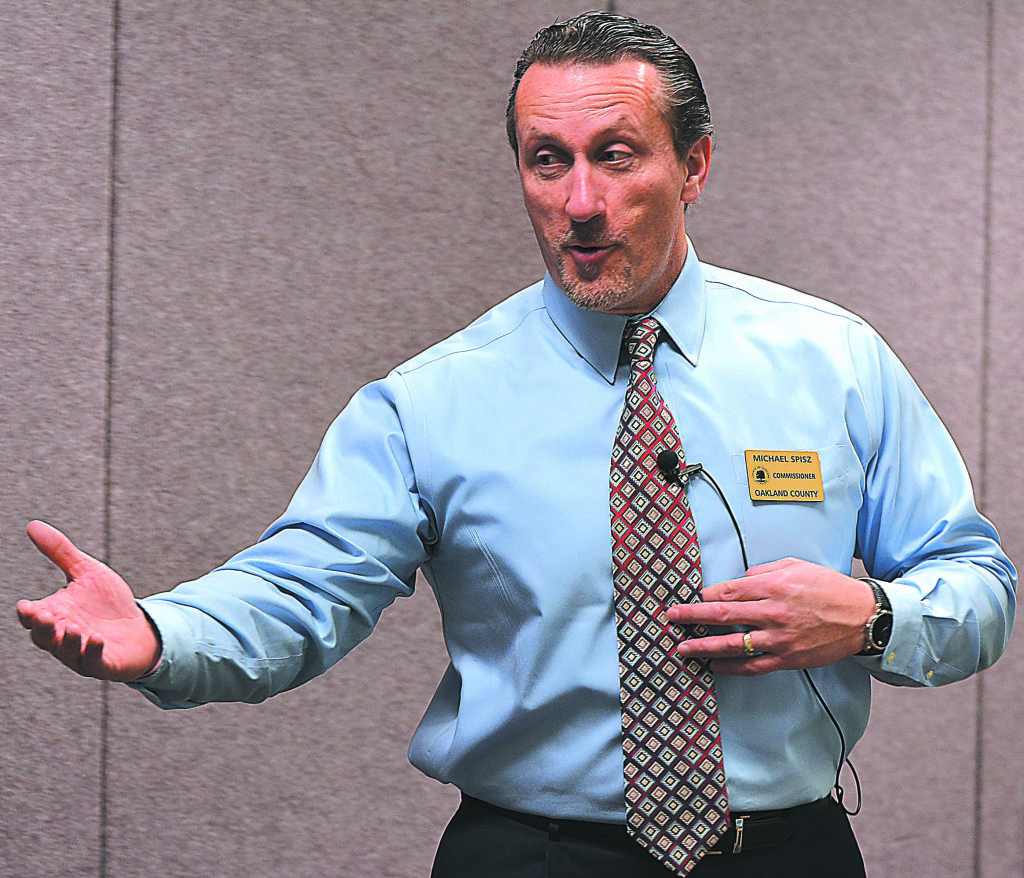There are plenty of crisis hotlines out there to deal with issues such as suicide prevention, domestic violence and substance abuse.
But soon one of those hotlines in Oakland County will have its call takers trained to help victims of the second largest criminal activity in the state and country – human trafficking.

That was the word last week from county Commissioner Mike Spisz (R-Oxford) when he addressed the Michigan Abolitionist Project’s Lake Orion-Oxford Community Group during its monthly meeting at the Oxford Public Library.
Spisz, chairman of the county’s Human Trafficking Task Force, said the county is working with a nonprofit organization that already has a crisis hotline in place to add human trafficking to the many issues its call takers are already trained to handle.
The idea is to have the call takers do the same thing for human trafficking victims that they currently do for people who use the hotline for other problems – evaluate the situation, identify what the issues or needs are, determine the type of help that’s required and get it for them, whether that means involving law enforcement, a government agency or another nonprofit organization like HAVEN that assists victims of domestic violence and sexual abuse.
Spisz noted “we don’t want to put them on hold” or worse, have them encounter a recording when they call.
“We want somebody that’s manning the phone all the time (who) can help immediately” and “be able to send help to them if they need it,” he told this reporter.
Spisz explained the county is looking at using an existing organization and hotline because “creating something specific . . . just for human trafficking didn’t really make sense.”
“Adding to what they already do makes more sense,” he said. “The group we’re looking at going with, they have the ability to react quickly because they already react quickly to other (crisis situations).”
Time is the key factor.
“We want quick turnaround, quick response time,” he said.
Spisz wants to have the ability to remove human trafficking victims from dangerous or abusive environments and place them somewhere safe as soon as possible.
The commissioner wasn’t ready to release the name of the nonprofit organization at this point.
“I really don’t want to throw the name out there because they haven’t confirmed everything yet,” he told this reporter.
But he did note the county currently contracts with it for other services and this organization has received grant money from the state to add human trafficking to the scope of its work.
In addition to assisting victims, the hotline will be useful when it comes to collecting accurate data regarding human trafficking.
Considered a modern-day form of slavery, human trafficking occurs whenever someone uses “force, fraud or coercion” to control or exploit another person for financial gain, according to Polaris, a nonprofit organization, based in Washington D.C., that works to combat and prevent this criminal activity. The two types are labor trafficking (forcing individuals to work against their will) and sex trafficking (exploiting people sexually for profit).
Polaris has identified 40,987 cases of human trafficking through its national hotline between 2007 and 2017.
In 2012, the International Labour Organization estimated there were 21 million human trafficking victims worldwide, of which 16.5 million were exploited for labor and 4.5 million for sexual purposes. Victims included women, men and children of all ages.
Plenty of statistics regarding what’s happening at the global, national and state levels are available, but it’s not clear what the effects of human trafficking are in Oakland County.
“We don’t really know because there (are) no good numbers out there down to that level,” Spisz said.
Spisz is hoping the hotline will be ready to announce at a press conference this summer. Right now, the holdup is getting people trained to interact with human trafficking victims.
“We don’t want to put a number out there for everybody to call unless we know that they are skilled enough and determined enough (to handle this issue),” he said.
Since the task force’s creation in January 2017, one of the things it’s discovered is “there’s a lot of assistance” available for juvenile victims of human trafficking, but not for adult victims. “Once you hit 18, it starts to get really gray,” Spisz said.
Spisz explained “there’s not a lot of third parties out there that can help” adults and victims often don’t want to call 9-1-1 for assistance because they assume it’s “automatically criminal” whenever the police get involved and they might get arrested.
“What’s happening might not be criminal (on the victim’s part), but they’re worried about it being considered criminal,” he said.
The task force has been raising public awareness about human trafficking via the website www.oakgov.com/HumanTrafficking it launched earlier this year and its social media campaign.
“We reached almost 1.65 million people through this website and through our communication, which was far beyond what we ever expected it to be,” Spisz said.
Having more people better versed in what human trafficking is and all the various forms it takes will hopefully lead to them reporting potential activity whenever they see it, so it can be investigated and stopped.
“If it doesn’t pass the common sense test, something might be wrong,” Spisz said.
He stressed that if a person suspects human trafficking is occurring, they should call either 9-1-1 or the National Human Trafficking Hotline 1-888-373-7888. They can also text the words “INFO” or “HELP” to 233733 (BeFree).
“Don’t try to take (matters) into your own hands” because “now, you’re putting the victim in danger (and) you’re putting yourself in danger,” Spisz warned.

Leave a Reply